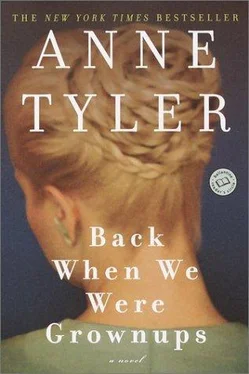“No more than usual,” Rebecca said.
“And haven’t I already met this person?”
“Yes, but this will be his, sort of, formal introduction to the family as a whole.”
“Oh. Okay,” NoNo said.
She didn’t seem impressed by that part about the man in my life.
Before Rebecca could place the next call, the telephone rang: Patch, in high dudgeon. “How come you invited Min Foo to dinner and not me?”
“Well, I was just—”
“Is this because she’s your real daughter?”
“Patch! For heaven’s sake! I’m inviting all of you!”
“And I have to hear it through the grapevine,” Patch said. “I’ve a good mind not to come.”
“Well, if you’d stay off the phone long enough for me to call you in the first place!” Rebecca snapped. And she slammed down the receiver.
Only Biddy reacted as she was supposed to. “A man in your life! Really?” she said. “Oh, Beck, I didn’t realize. Is this the one who was there when I stopped by the other evening?”
“That’s him,” Rebecca said.
“Oh, this is so exciting. Tell me what food to bring.”
Sometimes Rebecca thought that the whole point of having lots of daughters was, the law of averages said at least one of them might behave right at any given time.
Saturday turned out warm and humid, more like July than October. This was a pity, because Rebecca had bought a fall outfit expressly for the occasion. It was a tailored gray straight-skirted suit, very subdued — unnoticeable, even. (And certainly nothing a hippie would wear.) She put it on anyhow, along with her flight-attendant pumps. She was plain on the surface but fancy underneath, because she had also bought new lingerie — sheer black lace that would have to be washed by hand. She didn’t care. Also, it was killingly expensive. She didn’t care at all. She had plans.
When she went downstairs to the kitchen, where Biddy and Troy were unwrapping food, Troy did a double take. “Why! It’s Joan Crawford!” he said. Rebecca struck a model’s pose, nose raised snootily in the air, and Biddy stopped work to say, “Are those shoulder pads? Goodness.” Then she told Poppy, “Quit that!” because he was picking at a pie crust. She herself wore a ruffled blue sundress, which looked a little too froufrou on her spare frame, and Troy and Poppy wore coats and ties. Rebecca felt a rush of affection. It was nice of them to go to the trouble.
Will rang the doorbell precisely at eight. He was in a charcoal wool suit and his upper lip shone with sweat, either from the heat or from nervousness. “Don’t you look stylish!” Rebecca said. When she kissed him, she smelled aftershave — something spicy — and all at once she felt lit up and optimistic, as if this were her very first party rather than her millionth.
“Am I early?” he asked. “Am I late?”
“You’re right on time,” she told him. “Come out back while we see to the food,” and she took hold of his arm.
“Now, Biddy you’ve already met,” she said as they entered the kitchen, “and you know Poppy, and this is Biddy’s, um, Troy. Troy, this is Will Allenby.”
“How do you do,” Troy said, shaking Will’s hand. Troy had extremely vivid blue eyes, and when he was introduced to people he often gave the impression of peering into their souls, drilling them with his hundred-watt gaze. Will responded by leaning forward determinedly and meeting Troy’s stare straight on, so that for a moment they seemed to be butting heads.
Poppy said, “Why, hey, there! Good to see you again!” This could have been a bluff, but when Will said, “Good to see you, Mr. Davitch,” Poppy said, “Please. Call me Poppy.”
Which wasn’t something he allowed just everyone. (Barry, for example, had recently been told that they weren’t on close enough terms yet.) Rebecca sent Poppy a grateful smile.
She said, “Once you get to know the Davitches, Will, you’ll realize we don’t have a prayer of expecting them when they’re due; so I suggest we make ourselves comfortable while we’re waiting. Can I offer you a drink?”
“No, thanks,” Will told her, but Poppy said he’d like a Scotch, and everyone else wanted white wine.
In the parlor, Rebecca lit the candles while Troy saw to the drinks. Biddy was asking Will where he came from, what he did for a living, how long he’d known Rebecca — the usual small-talk questions, which Will answered dutifully. “Church Valley, Virginia,” he said, “but now I live in Macadam. I’m head of the physics department at Macadam College. I can’t say for certain when I met Rebecca. Fifty years ago? More?”
“Fifty years!” Biddy exclaimed.
“I’ll never adjust to the sound of that,” Rebecca said. She accepted a glass of wine from Troy and sat down on the couch, close to Will but not touching. “Telling people I did such-and-such half a century back, or haven’t seen so-and-so in forty-five years… I think, What am I saying? Can I really have been alive that long?”
“And so now you and Beck are getting acquainted all over again,” Biddy told Will. She spoke in an indulgent tone, as if she found their story… cute, Rebecca thought. “It must be complicated, living in two different towns, though.”
“Yes, my odometer’s taken something of a leap,” Will said. He turned to Rebecca and confided, “Little cough in my engine lately.”
“Cough?”
“Kind of coughing noise when I accelerate.”
Troy gave an abrupt laugh. “I would expect a physics professor to use a more technical term,” he explained when everyone looked at him.
“No, Troy, I’m not in the least conversant with automobile engines,” Will told him. “I have to put myself in the hands of strangers — mechanics who charge me a fortune and then, half the time, don’t fix the problem.”
“Oh, you should go to Aldo,” Rebecca said.
“Aldo?”
“The man who coaxes my Chevy along. He’s very gifted. And such a nice person! Biddy, you know Aldo.”
“Oh, Aldo’s great,” Biddy said. “He solved my squeak when nobody else could.”
“Aldo is forever bragging about his wife,” Rebecca told Will. “How pretty she is and how talented and how she makes everything from scratch. Even the slipcovers. Even the rugs. Tanya, her name is. Tanya this, Tanya that, all the livelong day. Tanya and he are learning ballroom dancing. Tanya and he are planning a trip to Hawaii. Tanya and he got professionally made up and had their photograph taken as Bonnie and Clyde. The Man Who Loves His Wife, I call him. ‘Doesn’t that sound like the world’s most incredible marriage?’ I’m always asking people.”
Will said, “This is your… mechanic?”
“Yes, and then last month he told me Tanya was at the doctor’s. I said, ‘I hope it’s nothing serious.’ He said no, she just needed to increase her medication. It turns out she’s subject to these demented delusions and always has been. She thinks he’s plotting to leave her; she swears that he’s unfaithful; she once showed up on a woman’s porch waving a souvenir Japanese sword. Two of their sons won’t come home anymore. The oldest son asked him once, ‘How can you put up with her?’ and Aldo told him, ‘Because it’s somebody else. It’s not the real, true Tanya.’”
“This is the man who repairs your car,” Will said.
“Right,” she said. “I just think he’s so… admirable. He still believes his wife is amazing after all that’s happened. He still boasts about her hooked rugs and gets made up like Bonnie and Clyde.”
Will started to say something, but just then the front door slammed open. “Oh! Finally!” Rebecca said, and she went out to the foyer.
Min Foo stood there with Hakim, who was lugging one of those infant car seats that made parents appear to be returning from a successful trip to the farmers’ market. Abdul slept soundly inside, curled over like a little cashew with a knit cap partially covering his eyes. “I know! I know! You said adults only,” Min Foo told Rebecca. “But what do you expect? I’m nursing! What do you expect me to do? Watch it, Hakim. Don’t bang him into the wall.”
Читать дальше












